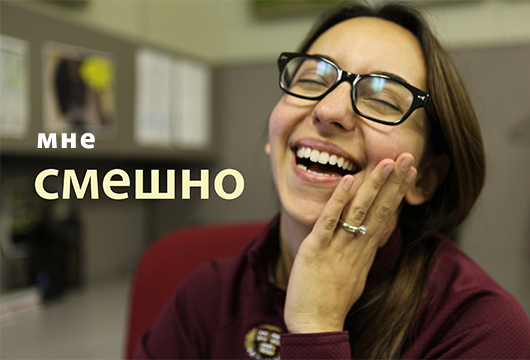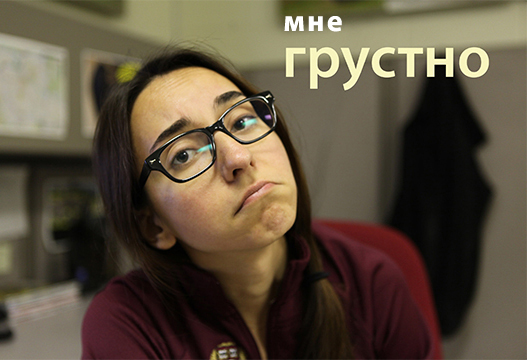Meet Your New Friends: Russian Adverbs Posted by Jenya on Sep 23, 2014 in language, when in Russia
The last few mornings have been relatively chilly, at least in the state of Michigan. As I was getting my fall coat out of the closet, it occurred to me that now is the perfect time to do a post on adverbs. “I don’t see the connection,” – you might say. Well, let me explain. In Russian, adverbs can be very handy in helping one express the state of their body and mind.
Phrase/sentence structure is a bit different in the Russian and English languages. While changing the pronoun in English requires you to change the verb (I am/he is/they are), this is not the case with similar phrases in Russian because the verb is simply not present in many instances. Don’t try to explain the differences too hard, or you might pop a vein J . My goal for this post is to help you learn and hopefully utilize these Russian speech patterns in the future.
The pattern we will be working on today is мне/тебе/нам/вам/ей/ему/им + adverb.
Мне/тебе/нам/вам/ей/ему/им are Russian personal pronouns, or a specific form of Russian personal pronouns to be exact. You will frequently use this form of Russian personal pronouns in combination with adverbs or reflexive verbs.
Just in case, here is a link to the table on Russian pronouns.
мне/тебе/нам/вам/ей/ему/им холодно – I am/you are/we are/you are plural/she is/he is/they are cold
мне/тебе/нам/вам/ей/ему/им жарко – I am/you are/we are/you are plural/she is/he is/they are hot
мне/тебе/нам/вам/ей/ему/им страшно – I am/you are/we are/you are plural/she is/he is/they are scared
мне/тебе/нам/вам/ей/ему/им можно – I am/you are/we are/you are plural/she is/he is/they are allowed
мне/тебе/нам/вам/ей/ему/им плохо – I am/you are/we are/you are plural/she is/he is/they are not feeling well
мне/тебе/нам/вам/ей/ему/им хорошо – I am/you are/we are/you are plural/she is/he is/they are feeling well or comfortable
мне/тебе/нам/вам/ей/ему/им удобно – I am/you are/we are/you are plural/she is/he is/they are comfortable
мне/тебе/нам/вам/ей/ему/им грустно – I am/you are/we are/you are plural/she is/he is/they are sad
мне/тебе/нам/вам/ей/ему/им одиноко – I am/you are/we are/you are plural/she is/he is/they are lonely
мне/тебе/нам/вам/ей/ему/им скучно – I am/you are/we are/you are plural/she is/he is/they are bored
мне/тебе/нам/вам/ей/ему/им обидно – I am/you are/we are/you are plural/she is/he is/they are offended
мне/тебе/нам/вам/ей/ему/им смешно – I/you/we/you plural/she/he/they find it funny
мне/тебе/нам/вам/ей/ему/им трудно – It is hard for me/you/us/you plural/her/him/them
мне/тебе/нам/вам/ей/ему/им легко – It is easy for me/you/us/you plural/her/him/them
Below are some practice sentences to help you remember these simple phrases. I challenge you to share your translated version (in the comment section)!
Мне одиноко без тебя.
Игровая приставка сломалась, и теперь им скучно.
Ему смешно, а мне плакать хочется.

Build vocabulary, practice pronunciation, and more with Transparent Language Online. Available anytime, anywhere, on any device.






Comments:
David Roberts:
Excellent! I’ll try your exercise without looking anything up:
I’m cold under this blanket (would this be interpreted as a request for another blanket or as a hint that the interlocutor might like to try and generate a bit more warmth?)
Judging by the look of his face he’s feeling hot
Of course she’s scared to be left alone
Can I have a sweet (British word for candy) after the meal?
You’re pale – are you not well?
I’m absolutely fine (not sure whether тут needs translating)
Are you comfortable?
I’m sad because you’ve gone away
I’m lonely without you
The play-station’s broken and now I’m bored (guessing at Игровая приставка)
I’m offended that don’t pop in
He thinks its funny but I feel like crying
Им всегда трудно, они постоянно жалуются – will have to look up постоянно жалуются.
It’s easy for youto talk, you’ve not got young kids
Your sentence “As I was getting my fall coat out of the closet” is a good illustration of how British and American English are diverging! Native Russian speakers might like to have a go at putting it into British English.
Thanks again for this very uesful post!
Jenya:
@David Roberts David, great job! With the exception of a couple of little things, you pretty much nailed every sentence on the head. The sentence “Мне тут хорошо” literally means “I feel great/very comfortable here (in this particular place, like your summer cottage for instance).” Perhaps, being a bit more descriptive on my part would have made the job easier 🙂 . “Им всегда трудно, они постоянно жалуются” means “They are constantly struggling, they always complain.”
мама:
Замечательно, моя дорогая!
Great job, my dear!
Daniel Jenkins:
Brilliant layout to aid study.